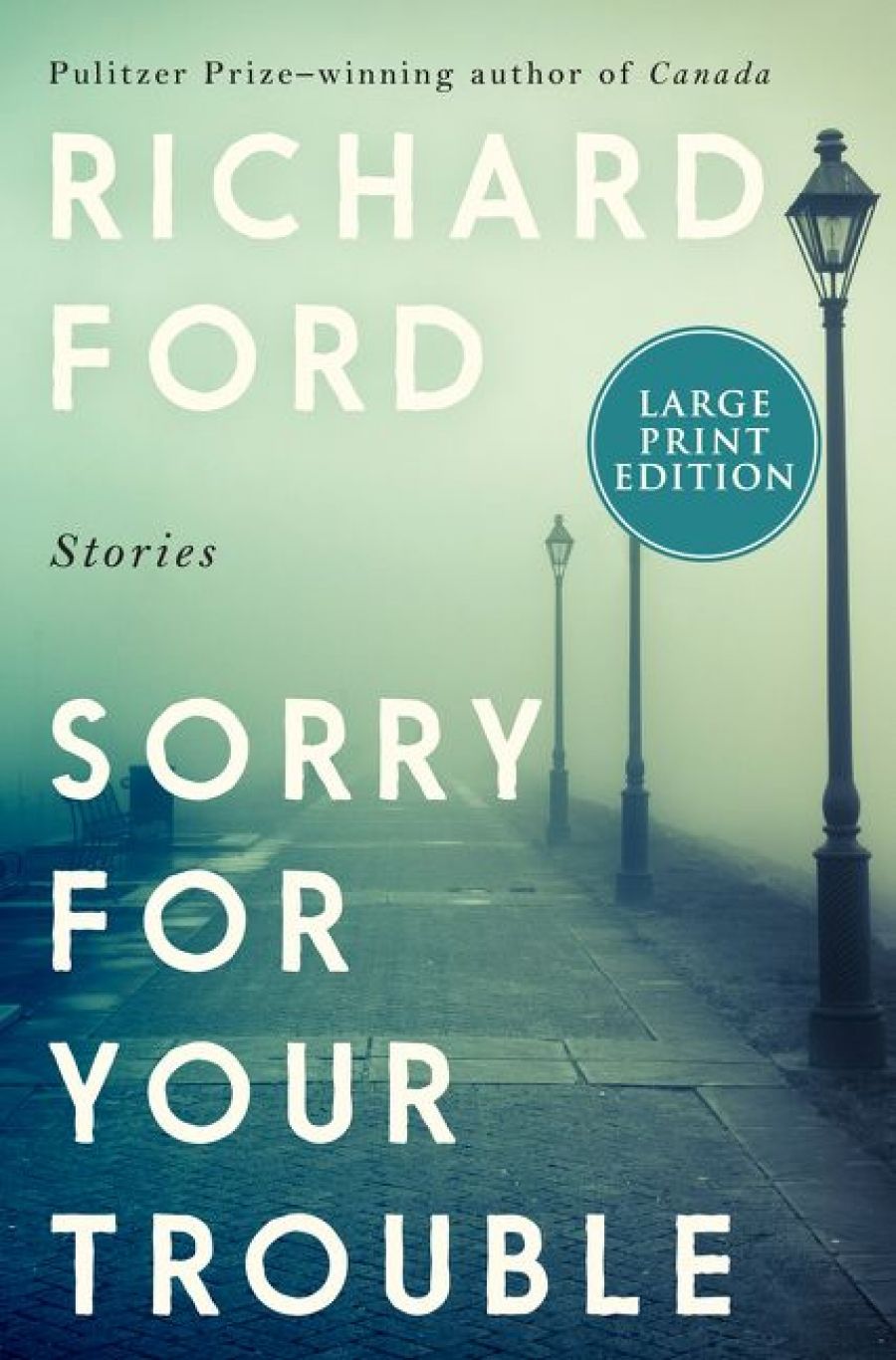
- Free Article: No
- Contents Category: Fiction
- Review Article: Yes
- Custom Highlight Text:
Richard Ford, born in 1944, is a North American novelist, short story writer, and anthologist of considerable distinction. His recurring character Frank Bascombe – The Sportswriter (1986), Independence Day (1995), The Lay of the Land (2006), Let Me Be Frank with You (2014) – is a commanding figure of American letters to rank with John Updike’s Rabbit Angstrom, each a protagonist used by his creator over several novels as a litmus test of his contemporaries and their not always united states.
- Grid Image (300px * 250px):

- Book 1 Title: Sorry for Your Trouble
- Book 1 Biblio: Bloomsbury, $29.99 pb, 255 pp
- Book 1 Readings Link: booktopia.kh4ffx.net/1m4MB
Seven of the nine stories are short. The two longest, ‘The Run of Yourself’ and ‘Second Language’, clock in at around fifty pages. They, in particular, reward not only reading but rereading. The opening sentence of the former is bald enough. ‘The second summer after Peter Boyce’s wife died, he decided he’d rent the little house near the end of Cod Cove Road.’ The latter, ‘Second Language’, takes four pages to get to the nitty gritty. Jonathan and Mary Linn Bell are youngish – he is forty-six – rich, and blissfully married Democrats. Jonathan has copious plans for them.
All of which would very likely have taken place if one spring morning at breakfast, with impeccable mountain light streaming in over the meadow, and snow still on the peaks, Mary Linn hadn’t sat down with a cup of tea, looked across the table at Johnny, smiled curiously and remarked that she’d probably feel better if she would just lay her head on her folded hands for a moment, which she did. And died before Johnny could reach to touch her. She had cancer – the Idaho doctor said – something deep, deep within her limbic lobe. Dying was likely the only real symptom she’d experienced.
The reader, or this reader at least, is no less shocked than Jonathan. ‘Second Language’, like many of the stories in Sorry for Your Trouble, becomes a tale of a second marriage. The relative length of the story permits it to concentrate on divorce, old age, and death.
I have been reading Richard Ford since the mid-1980s, and I have been reviewing him since 1990. He never ceases to delight. I understand from a bespoke bookseller friend that my review of Wildlife (1990) in the National Times offended Ford, which was not my intention. I have since learned that Ford is quick to take offence at reviewers. Colson Whitehead, for one, records that Ford spat on him at a literary gathering, declaring: ‘You spat on my book in your review, so I spit on you.’ I still treasure the burning bear in Wildlife as I treasure Michael Fitzjames’s graphic, which illustrated my review.
Richard Ford and I have grown old together, as have his characters. This would appear to be a serious consideration for at least one American reviewer of Ford, Zachary Hoole, who wrote:
Even though I turn 45 years old this year, it felt as though these stories weren’t for me. Ford is in his mid-70s, and most of his characters in this collection are in their 50s and beyond. I felt as though I was still too young to fully grasp or understand [what] these vignettes of love and death were all about. The book was probably, in many ways, wasted on me.
Gobsmacked is how this leaves me. One can only wish this reviewer a long life so that he may derive pleasure if not instruction from Ford – Richard or Ford Madox, or any other writer of maturity. Texts test the critic, rather than the other way around. Ripeness is all.
‘Good choices don’t make very good stories,’ says Barbara early in the first story, ‘Nothing to Declare’, a declaration that states a dominant theme of the book. Her ex-boyfriend, Sandy McGuinness, disagrees. This apparently realist book (remember ‘Dirty Realism’?) is larded with literary echoes that take it out of the quotidian into the ethereal. Virginia Woolf, especially Mrs Dalloway, and Henry James, whose The Portrait of a Lady is quoted, play a role, and I would like to think I hear echoes of Philip Larkin whose ‘The Whitsun Weddings’ ends:
… We slowed again,
And as the tightened brakes took hold, there swelled
A sense of falling, like an arrow-shower
Sent out of sight, somewhere becoming rain.
Here is the climactic moment of Ford’s story ‘Leaving for Kenosha’, in which the narrator drives his daughter to dinner after she has bid farewell to a school friend whose family is leaving for Kenosha because of the hurricane that destroyed New Orleans.
And for that instant, Walter Hobbes experienced a sensation of something being about to happen. A feeling of impendment – not necessarily bad or good, just something in the offing. Though he knew that if he only paused in his thinking, as he’d recently learned to do, didn’t follow his thoughts all the way to where they led, or came from, then this sensation of impendment could subside.
The Larkin is more concentrated, but then it is poetry. But both the poetry and the prose are full of a sense of wonder. Both are instances of what James Joyce might have called ‘epiphany’, the essence of great writing.


Comments powered by CComment